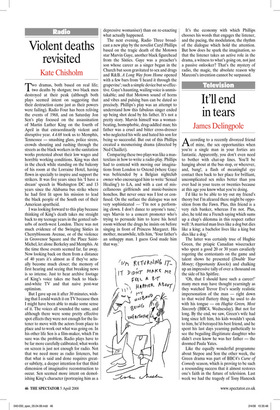Violent deaths revisited
Kate Chisholm
Two dramas, both based on real life; two deaths by shotgun; two black men destroyed at their peak (although both plays seemed intent on suggesting that their destruction came just as their powers were failing). Radio Four has been reliving the events of 1968, and on Saturday Jon Sen’s play focused on the assassination of Martin Luther King on the fourth of April in that extraordinarily violent and disruptive year. 4.4.68 took us to Memphis, Tennessee — smashing glass, police sirens, crowds shouting and rushing through the streets as the black workers in the sanitation works protested about their low wages and horrible working conditions. King was shot in the cheek while standing on the balcony of his room at the Lorraine Hotel, having flown in specially to inspire and support the strikers. It was five years since his ‘I have a dream’ speech in Washington DC and 13 years since the Alabama bus strike where he had first lit upon his mission to lead the black people of the South out of their American apartheid.
I was looking forward to this play because thinking of King’s death takes me straight back to my teenage years in the genteel suburbs of north-west London. There was not much evidence of the Swinging Sixties in Cherryblossom Avenue, or of the violence in Grosvenor Square and the Place SaintMichel, let alone Berkeley and Memphis. At the time those events seemed far, far away. Now looking back on them from a distance of 40 years it’s almost as if they’ve actually become much closer; the memory of first hearing and seeing that breaking news is so intense. Just to hear archive footage of King’s voice takes me back to blackand-white TV and that naive post-war optimism.
But I gave up on it after 30 minutes, wishing that I could watch it on TV because then I might have been able to make some sense of it. The voices all sounded the same, and although there were some pretty effective spot effects they were not enough for the listener to move with the actors from place to place and to work out what was going on. In his other life Sen is a film-maker, which I’m sure was the problem. Radio plays have to be far more carefully calibrated; what works on screen is just not enough for radio. Not that we need more as radio listeners, but that what is said and done requires greater subtlety, a deeper intention for that third dimension of imaginative reconstruction to occur. Sen seemed more intent on demolishing King’s character (portraying him as a depressive womaniser) than on re-enacting what actually happened.
The next evening, Radio Three broadcast a new play by the novelist Caryl Phillips based on the tragic death of the Motown star Marvin Gaye, another black figurehead from the Sixties. Gaye was a preacher’s son whose career as a singer began in the Church but soon gravitated to sex and drugs and R&B. A Long Way from Home opened with a few bars from ‘I heard it through the grapevine’; such a simple device but so effective. Gaye’s haunting, wailing voice is unmistakable; and that Motown sound of horns and vibes and pulsing bass can be dated so precisely. Phillips’s play was an attempt to understand how this fabulous singer ended up being shot dead by his father. It’s not a pretty story. Marvin himself was a womanbeating, homophobic, drug-addled man; his father was a cruel and bitter cross-dresser who neglected his wife and hated his son for being so successful. But out of this Phillips created a mesmerising drama (directed by Ned Chaillet).
Comparing these two plays was like a masterclass in how to write a radio play. Phillips had to contend with moving our imaginations from London to Ostend (where Gaye was befriended by a Belgian nightclub owner who encouraged him to write ‘Sexual Healing’) to LA, and with a cast of miscellaneous girlfriends and music-business honchos. But never once was I lost or confused. On the surface the dialogue was not very sophisticated — ‘I’m not a performing clown. I don’t dance to anyone’s tune,’ says Marvin to a concert promoter who’s trying to persuade him to leave his hotel room without the drugs he insists on before singing in front of Princess Margaret. His mother, meanwhile, tells him, ‘Your father’s an unhappy man. I guess God made him that way.’ It’s the economy with which Phillips chooses his words that engages the listener, and the pacing, the modulation, the rhythm of the dialogue which hold the attention. But how does he spark the imagination, so that the listener takes an active role in the drama, a witness to what’s going on, not just a passive onlooker? That’s the mystery of radio, the magic, the absolute reason why Marconi’s invention cannot be surpassed.


































































 Previous page
Previous page